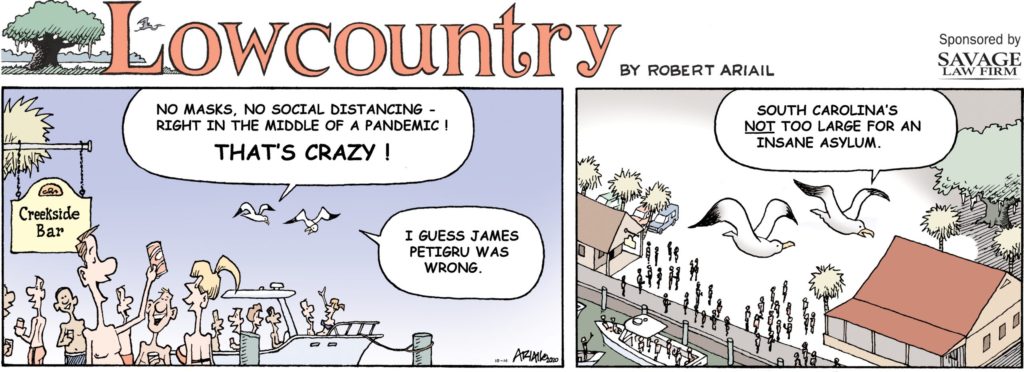STATEHOUSE REPORT | ISSUE 20.01 | JAN. 1, 2021

HAPPY BIRTHDAY TO US, HAPPY BIRTHDAY TO US. This issue marks the start of Statehouse Report’s 20th year in covering the S.C. General Assembly and Palmetto State politics. If you enjoy what we do, consider a donation and encourage your crew to subscribe.
BIG STORY: Legislature poised to tackle multiple issues amidst pandemic
LOWCOUNTRY, Ariail: Too small for a republic
COMMENTARY, Brack: Legislators should be bold after a decade of timidity
SPOTLIGHT: S.C. Democratic Caucus
FEEDBACK: Two letters in the U.S. Postal Service
MYSTERY PHOTO: Different kind of S.C. scene
Legislature to tackle multiple issues amidst pandemic

By Andy Brack and Rodney Welch | The typically conservative S.C. General Assembly will be conservative with the coronavirus pandemic when the 2021 session opens, particularly after at least two members apparently contacted the disease in end-of-the-year organizational meetings.
The virus will control the tempo of the legislature, said Senate President Harvey Peeler, R-Gaffney.
“COVID-19 will be the boss,” he said. “The state Senate is not a bunch of scaredy-cats, but we are going to continue to act responsibly, so that will be on everyone’s mind — this virus and how it affects the state.

“The whole COVID situation has an Alamo feeling to it, meaning we’re fighting this virus while waiting on the vaccine to arrive and save the day,” he said. “I tell my senators, “Just act like everyone else has the virus.’ That’s the best way to act. That way you’ll be sure to wear a mask, keep your distance and wash your hands. Use good hygiene.”
House Speaker Jay Lucas, R-Darlington, said despite the uncertainty of what’s ahead with the virus, he’s looking forward to dealing with unfinished business of the 2020 session cut short by the pandemic.
“The House will continue to have every precaution in place to ensure we meet in a safe manner, as well as implement a few new protocols, including a new voting system that will allow members to vote from the balcony and allowing some committee meetings to be held virtually, that we hope will make meeting and voting more flexible for members,” Lucas told Statehouse Report. “While last year was like nothing I have ever seen in my 22 years in the House, I am confident that we will continue to do the work of the people of this state in a safe and productive manner, even if some things may look different.”
In the early days of the session, the Statehouse will feel different as the lobby between chambers likely will be closed to the swarms of lobbyists and advocates who try to snag lawmakers for chats. Statehouse insiders also predict in-person meetings in the House and Senate chambers will be limited early with much legislative work done by videoconferences, which have been used successfully since the summer. As members of the General Assembly get vaccinated, more in-person meetings should occur.
“[For] standing committees and subcommittees, we’re trying to work that out now to where we meet virtually or some type of hybrid meeting in the committee rooms that have virtual capability,” Peeler said, adding that he wanted in-person meetings with the public as soon as practical.

Outgoing Black Caucus Chairman Jerry Govan, D-Orangeburg, said the COVID-19 pandemic also will change the landscape of the legislative body, weighing on everything from debates on the economy and health care to education and how government works.
“I think the most plausible and prudent thing for the state to do is to thoroughly ascertain where we are as a state and devise a four-, eight- and 12-month plan in response to the ebb and flow of the pandemic, which has clearly gotten worse and is out out of control even as we now have multiple sources of the vaccine in play,” he said. “The problem is that we do not have a uniform logistical system set up for distribution which in my opinion should be handled at the federal level.
“Therefore, the top priorities for the General Assembly must be ensuring that our health care system is both efficient and fair, preserving our economy — particularly small businesses — and diversification of our educational system that ensures that all children learn.”
Here’s a deeper look at some of the issues lawmakers will grapple with in the months ahead:
State budget packs $1.2 billion extra punch
Because the pandemic cut short the 2020 legislative session, lawmakers didn’t pass a new budget. Instead, they approved a measure to keep state spending at the same level as the previous year. In turn, that had a couple of ramifications:
First, it led to a big surplus because of hundreds of millions of unspent reserves that weren’t budgeted. There also were millions of unbudgeted new tax dollars that piled up. According to a Nov. 10 preliminary forecast for the state’s 2021-22 fiscal year, lawmakers should have about $1.2 billion in new revenue to spend over and above what regularly comes in. Read our previous coverage.
Second, the extra funds allowed the state to continue to operate during challenging times without making mid-year cuts experienced by other states — because South Carolina had the ability to channel some of the extra money for emergencies. That provided stability in unstable times — something budget overseers like.

“We were on the cusp of doing teacher pay raises and other things for education,” said Senate Minority Leader Brad Hutto, D-Orangeburg. “Obviously, we’ve had to redirect money into the state Department of Health and Environmental Control (DHEC) and other things related to health care, so we’re going to have to go back and revisit those budget issues.”
Lucas said there was a lot of uncertainty still around the 2021-22 budget, but would have a clearer view in the coming months.
Redistricting to get attention in 2021

Legislators also will redraw lines for S.C. House, S.C. Senate and congressional districts in 2021 based on the results of the 2020 census. A job done every 10 years, Republicans have used the process since the 1990s to draw districts that boosted the number of GOP members into increasingly larger majorities in each chamber. In 2021, Democrats will start with 43 of 124 House seats (one less than 2020) and three fewer in the Senate (16 of 46).
“I am confident that the process will remain as fair, open and honest as it has been the past three times,” Lucas said. “Last time, our plan received preclearance from the Obama-era Justice Department, a sure signal that South Carolina’s redistricting efforts were fair. I have no reason to believe they would be anything but that this time as well.”
Some Democrats aren’t as hopeful.

“Democrats must first commit to sticking together and not allow Republicans to divide and conquer as they have in past redistricting efforts by picking us off and packing districts to their advantage,” said veteran House legislator Gilda Cobb Hunter, D-Orangeburg. “I have again prefiled legislation requiring an independent commission to draw lines, but I am not hopeful of its chances for passage.
“The [redistricting] plan will be made fairer by a unified Democratic caucus and an active and engaged conversation from voters insisting that legislators draw fair maps. I’m convinced that holding the line is not a position that’s in the best interest of good governance for our state.”

Rep. Wendy Brawley, D-Richland, said she hoped Democratic legislators didn’t “just settle” for lines drawn by Republicans.
“That means we Democrats must get voters involved in the process to ensure the most fair process possible,” she said. “For me, just holding the line is not acceptable. We should be prepared to pursue all legal avenues to ensure lines are fairly and equitably drawn.”
Education improvements on tap
State Rep. Rita Allison, the Spartanburg Republican who chairs the House Education and Public Works Committee, said lawmakers will focus on improving and reforming the state’s education network.

Budget discussions will focus on recruiting and retaining teachers as well as helping students catch-up from work they missed during pandemic shutdowns and alterations.
“A lot of them have gotten behind during COVID,” she said. “[We have] to be able to fund situations so that we can catch them up and hopefully get them back in school in the coming year so that they are caught up.”
Abortion bill will be back
With more state senators in the coming year, Republicans will work to pass stricter legislation related to abortion, Peeler said. It most likely will be so-called “fetal heartbeat” legislation, which permits abortion only in rare circumstances.
“I feel optimistic that we will move forward for a pro-life bill early on in the session.” he said.
Peeler said he could not predict how extensively the bill would limit abortion, but did allow that the Senate’s Medical Affairs Committee will stay busy this year.
But Hutto questioned the annual push, which fails year after year and takes up lots of floor time that could be devoted to issues that impact people hurting across the state.
“We, of course, would like to focus on education and health care,” Hutto said. “They, apparently, would rather focus on something else. I’m hoping we’ll get to a general discussion about the state of our children and how they’ve fared through the pandemic, [and] the state of our economy and how we got a lot of people that are out of work and small businesses that have closed.
“I think the people of South Carolina expect us to get up here and do work that will be productive toward getting everybody back to whatever the new normal is going to be. To me, to have to jump into a social issue that we already know the outcome is going to be declared unconstitutional seems to be a big waste of time.”
Other issues on the table

Health care. With one of every 17 South Carolinians contracting COVID-19 this year, inequities and shortcomings have become clearer in South Carolina’s health care system, lawmakers say, which means they’ll dive into possible changes to broaden accessibility.
“COVID-19 has underscored the importance of making quality health care affordable and accessible for all South Carolinians,” said Rep. Roger Kirby, D-Florence. “We must protect the capacity of our state’s hospital system, support free COVID testing and ensure that distribution of the vaccine goes smoothly until we beat this virus once and for all. Ultimately, we believe that the state must expand health care coverage to more South Carolinians by finally expanding Medicaid.”
DHEC. Peeler also has pre-filed a bill that would split DHEC and change how it operates. Peeler believes the state agency should focus on health while other agencies, such as the Department of Agriculture and the Department of Natural Resources, look after the environment. “This has been a concern of mine for years,” he said. “DHEC is just too large.”
Gun reform. Lawmakers again will try to close the “Charleston loophole” to require more time for federal officials to do background checks on people who want guns. Brawley said she also is sponsoring legislation to prohibit the sale of military-style assault weapons and high-capacity magazines.
Santee Cooper. Since a $9 billion failure to build nuclear plants in Fairfield County, SCANA was sold to Dominion Energy and state lawmakers have been under a lot of pressure to reform or sell Santee Cooper. After a summer of intensive behind-the-scenes lobbying fueled apparently by a company that wants to buy the state-backed utility, there likely will be hot debate on Santee Cooper’s future.
Hate crimes. Some lawmakers see momentum in South Carolina passing a law against hate crimes, particularly since the S.C. Chamber of Commerce supported the legislation recently. “This is an important piece of legislation for South Carolina to enhance our standing nationally as a forward moving state,” Kirby said.
Lawmakers will juggle lots of more issues with more than 1,000 bills already prefiled. Also getting attention will be potential changes to election laws, clarifying gubernatorial powers during crises, improving diversity in professional schools, raising the minimum wage, approving use of medical marijuana, increasing access to broadband and more.
Andy Brack is editor and publisher of Statehouse Report. Rodney Welch is a freelance writer from Elgin. Have a comment? Send to: feedback@statehousereport.com
Too small for a republic

Here’s an October cartoon from Robert Ariail that still works today. Enjoy it, from our sister newspaper, the Charleston City Paper. Love it? Hate it? What do you think: feedback@statehousereport.com.
Legislators should be bold after a decade of timidity

By Andy Brack, editor and publisher | After a legislative year where diddly met squat at the Statehouse, state legislators must get some real things done in 2021 to help the people of South Carolina.
 For the last dozen years, we’ve pushed for several broad policy goals to serve as a map of where the Palmetto State should head. Without a map, “you will flounder in proposal after proposal,” we wrote in 2009. That’s turned out to be mostly true, with only two initiatives — higher cigarette taxes and increased voter registration — coming off our list.
For the last dozen years, we’ve pushed for several broad policy goals to serve as a map of where the Palmetto State should head. Without a map, “you will flounder in proposal after proposal,” we wrote in 2009. That’s turned out to be mostly true, with only two initiatives — higher cigarette taxes and increased voter registration — coming off our list.
These days after months of people hurting, lawmakers should focus their zeal on policies that will really make a difference.
 HEALTH CARE: Is it right, particularly during a pandemic, that hundreds of thousands of South Carolinians have no affordable or accessible health care that optimizes preventive care? No. Lawmakers need to fix the state’s health care system — including totally overhauling the state’s health agency — by expanding Medicaid, investing more in telehealth, helping rural hospitals and more.
HEALTH CARE: Is it right, particularly during a pandemic, that hundreds of thousands of South Carolinians have no affordable or accessible health care that optimizes preventive care? No. Lawmakers need to fix the state’s health care system — including totally overhauling the state’s health agency — by expanding Medicaid, investing more in telehealth, helping rural hospitals and more.
JOBS: Small businesses are crying for help after the pandemic crushed local bars, restaurants, services and shops. We again urge legislators to develop a cabinet-level state post dedicated to adding and retaining 10,000 small business jobs per year.
EDUCATION: Is it right that too many of our students go to underfunded, underperforming schools? Nope. The best economic development plan for South Carolina’s future is to radically improve education, not nibble around the edges. Get to work to cut the dropout rate in half by 2025.
ENVIRONMENT: Instead of hyperventilating about Santee Cooper’s future, the state needs to put a huge emphasis on renewable energy. The state Public Service Commission seems to be making some strides in holding utilities more accountable, but legislators need to insist on much higher adoption of renewable energy.
TAXES: Is it right that more sales in South Carolina are exempted from sales taxes than those that are taxed? Heck no. Lawmakers must remove outdated special interest sales tax exemptions that cost billions in state revenue every year. Get rid of exemptions no longer are needed. Also work on overhauling the state’s entire tax structure through re-implementation of reasonable property taxes and fairer sales and income taxes.
GUN REFORM: Is it right that five legislative sessions have passed since the murder of nine worshippers at Emanuel AME Church in Charleston with state officials doing little to close the “Charleston loophole” to extend the waiting period for purchasing a gun? Absolutely not. Legislators need to move this year on a proposal to require at least five days to allow federal examiners more time for background checks. Reduce gun violence..
ROADS: Gradual increases to gas taxes in recent years are making a difference, but with potholes still out there, particularly on rural roads, there’s a lot more work to be done. Special emphasis needs to be made in boosting funding levels for more public transit in metro areas.
POVERTY. Is it right that South Carolina, with its world-class companies and billions in tourism dollars, still ranks among the poorest of states? Absolutely not. Lawmakers must focus broadly on reducing poverty, instead of fiddling around. They must develop an anti-poverty agenda that includes the jobs, education and health care components listed above to help lift the almost one in five South Carolinians in poverty into better conditions. Republicans need to stop pandering for tax cuts that help the people at the top. Democrats need to be louder about ways to create more prosperity for everyone.
CORRECTIONS: There has been good progress in reducing the prison population in recent years through creative alternative sentencing programs for non-violent offenders. You might be surprised to learn that between 2009 and this year, the prison population dropped a third — from 24,734 inmates at the state Department of Corrections to 16,333. Now let’s make sure the facilities are better staffed and safer.
POLITICS: With Democrats losing ground in the legislature in the 2020 elections, it’s more vital than ever that the state have a vigorous two- or multi-party political system of governance. One-party rule doesn’t really work to foster innovation.
It’s time to get down to real work, not just talking about it.
Andy Brack is editor and publisher of Statehouse Report. His column also is published in the Charleston City Paper, Florence Morning News, Greenwood Index Journal, The (Seneca) Journal, Camden Chronicle Independent and Hartsville Messenger. Have a comment? Send to: feedback@statehousereport.com.
S.C. Senate Democratic Caucus
 The public spiritedness of our underwriters allows us to bring Statehouse Report to you at no cost. This week’s spotlighted underwriter is the S.C. Senate Democratic Caucus. Organized almost 25 years ago, the Caucus has played an important role in many of the historic issues facing our state. As a vibrant minority party in the Senate, its role is to represent our constituents and present viable alternatives on critical issues. The S.C. Senate Democratic Caucus remains a unique place for this to occur in our policy process.
The public spiritedness of our underwriters allows us to bring Statehouse Report to you at no cost. This week’s spotlighted underwriter is the S.C. Senate Democratic Caucus. Organized almost 25 years ago, the Caucus has played an important role in many of the historic issues facing our state. As a vibrant minority party in the Senate, its role is to represent our constituents and present viable alternatives on critical issues. The S.C. Senate Democratic Caucus remains a unique place for this to occur in our policy process.
- Learn more about the Caucus at: www.scsenatedems.org.
We depend on the postal service
To the editor:
![]() Republicans in Congress have been working to kill the United States Postal Service (USPS) for over a decade. And in the months before the election, Trump went after it with deranged fervor. This ridiculous call to privatize ignores the fact that private companies like UPS and FedEx use the postal service to expedite their own deliveries.
Republicans in Congress have been working to kill the United States Postal Service (USPS) for over a decade. And in the months before the election, Trump went after it with deranged fervor. This ridiculous call to privatize ignores the fact that private companies like UPS and FedEx use the postal service to expedite their own deliveries.
I have watched as the workers in my local post office became weary and demoralized, trying to provide the best service they could. Right from mail-in ballots to Christmas packages, is it any surprise they haven’t been able to catch up?
I hope this disaster has reminded us all just how much we depend on the postal service, and that the new administration will fight to give it the resources it needs to do the job they want to do for us.
— Agnes Pomata, Wadmalaw Island, S.C.
Think more deeply on post office
To the editor:
I read your articles and usually I think you are on track, but I think you should do a little deeper thinking about the USPS. Consider that the USPS has always been on a slippery slope with the Congress because of the libertarian wing of the Republican Party; these are the people that have never liked public schools and Social Security, and they have a considerable voice in the current Republican Party.
The USPS has come to the place it is now largely because of the Republican-parented PAEA[Postal Accountability Act] of 2006. Over the past decades, the USPS has attempted to offer reforms from within but the Congress has not allowed it to stand up for itself. There have been and are many in the Congress that would like to see the USPS fail. Then they could say, “I told you so,” and then hand mail delivery off to their corporate friends.
I agree, there are many things at the USPS that need attention, but our own government is not helping.
— Larry Creel, Columbia,S.C.
Send us your thoughts
We love hearing from our readers and encourage you to share your opinions. But to be published, you’ve got to provide us with contact information so we can verify your letters. Letters to the editor are published weekly. We reserve the right to edit for length and clarity. Comments are limited to 250 words or less. Please include your name and contact information.
- Send your letters or comments to: feedback@statehousereport.com
Different kind of S.C. scene

Today’s Mystery Photo is something you don’t see every day in South Carolina. But what and where is it? Send your guess to feedback@statehousereport.com — and remember to include your name, home city and contact information.
 While we took a break from the mystery last week, two weeks ago we highlighted a scene at the dark scene at the corner of Market and Meeting streets in Charleston.
While we took a break from the mystery last week, two weeks ago we highlighted a scene at the dark scene at the corner of Market and Meeting streets in Charleston.
Congrats to all of the sleuthing elves who correctly identified it: Don Clark of Hartsville; George Graf of Palmyra, Va.; Steffani Schwerdt of Charleston; John Hart of Columbia; Jacie Godfrey of Florence; David Lupo of Mount Pleasant; Allan Peel of San Antonio, Texas; Kevin Mertens of Greenville; Frank Bouknight of Summerville; Dave Taylor of Darlington; Henry Eldridge of Tega Cay; and Matthew Brady of North Charleston.
- Send us a mystery. If you have a photo that you believe will stump readers, send it along (but make sure to tell us what it is because it may stump us too!) Send to: feedback@statehousereport.com and mark it as a photo submission. Thanks.
 ORDER NOW: Copies are in Lowcountry-area bookstores now, but if you can’t swing by, you can order a copy online today.
ORDER NOW: Copies are in Lowcountry-area bookstores now, but if you can’t swing by, you can order a copy online today.
ABOUT STATEHOUSE REPORT
Statehouse Report, founded in 2001 as a weekly legislative forecast that informs readers about what is going to happen in South Carolina politics and policy, is provided to you at no charge every Friday.
Meet our team
- Editor and publisher: Andy Brack, 843.670.3996
- Special correspondent: Lindsay Street
Donate today
 We’re proud to offer Statehouse Report for free. For more than a dozen years, we’ve been the go-to place for insightful independent policy and political news and views in the Palmetto State. And we love it as much as you do.
We’re proud to offer Statehouse Report for free. For more than a dozen years, we’ve been the go-to place for insightful independent policy and political news and views in the Palmetto State. And we love it as much as you do.
But now, we can use your help. If you’ve been thinking of contributing to Statehouse Report over the years, now would be a great time to contribute as we deal with the crisis. In advance, thank you.
Buy the book
Now you can get a copy of editor and publisher Andy Brack’s We Can Do Better, South Carolina! ($14.99) as a paperback or as a Kindle book ($7.99). . The book of essays offers incisive commentaries by editor and publisher Andy Brack on the American South, the common good, vexing problems for the Palmetto State and interesting South Carolina leaders.
More
- Mailing address: Send inquiries by mail to: 1316 Rutledge Ave., Charleston, SC 29403
- Subscriptions are free: Click to subscribe.
- We hope you’ll keep receiving the great news and information from Statehouse Report, but if you need to unsubscribe, go to the bottom of the weekly email issue and follow the instructions.
- Read our sister publications: Charleston City Paper (every Wednesday) | Charleston Currents (every Monday).
- © 2021, Statehouse Report, a publication of City Paper Publishing, LLC. All rights reserved.















 We Can Do Better, South Carolina!
We Can Do Better, South Carolina!